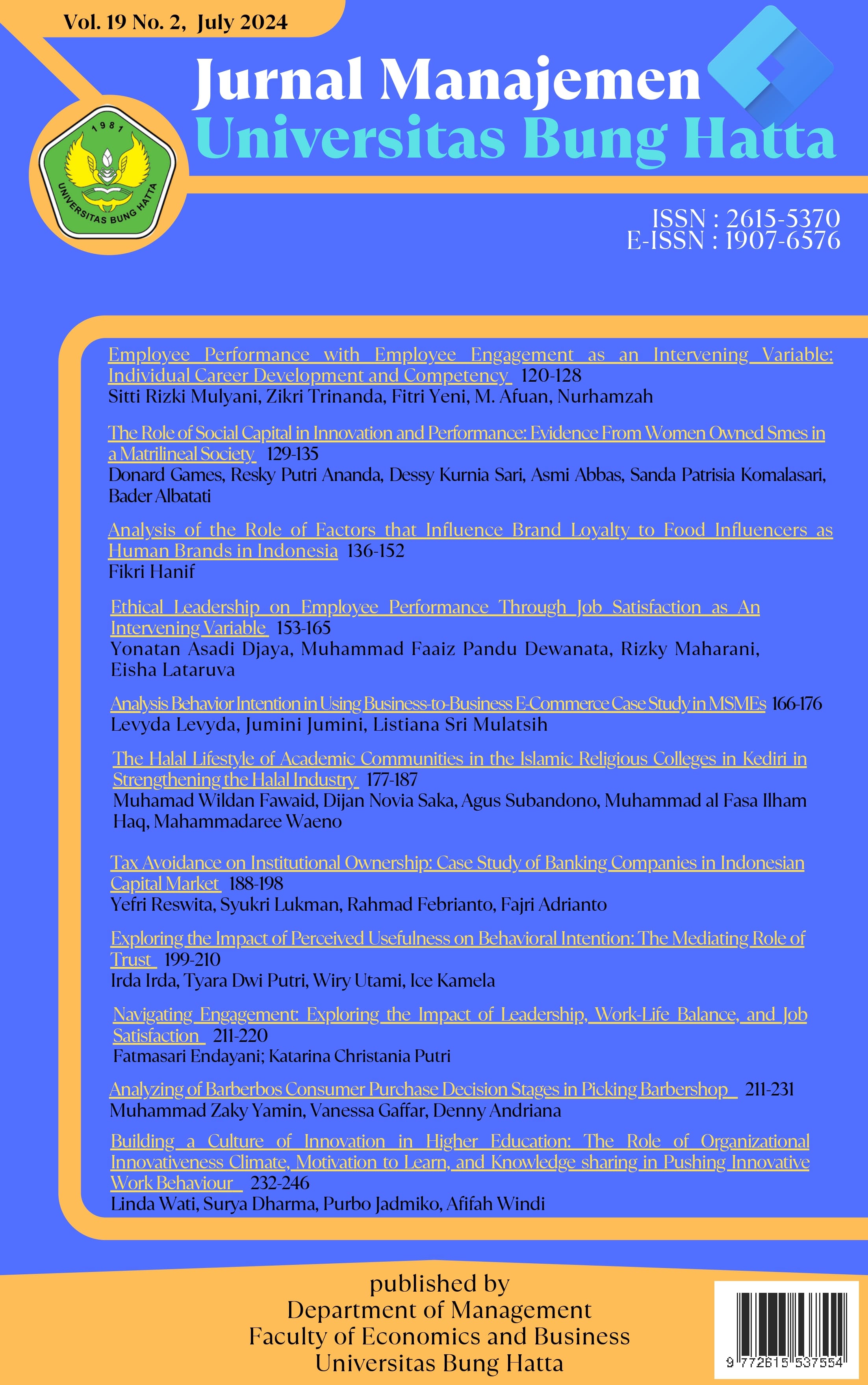Tax Avoidance on Institutional Ownership: Case Study of Banking Companies in Indonesian Capital Market
DOI:
https://doi.org/10.37301/jmubh.v19i2.25523Abstract
One of the causes of tax avoidance actions is influenced by corporate governance factors, including ownership structure. This study examines the relationship between institutional ownership structure and tax avoidance activities, with the moderating effect of independent directors. The research utilizes panel data from banking companies listed on the Indonesia Stock Exchange (IDX) from 2013 to 2022, totaling 430 firm-year observations. The estimation model employs Ordinary Least Square (OLS) approach. The results indicate that institutional ownership structure has a significant negative effect on tax avoidance actions. The moderating effect of independent directors does not have a significant influence on the relationship between institutional ownership structure and tax avoidance activities. Monitoring and internal control mechanisms are essential to mitigate actions detrimental to the interests of minority shareholders.
References
Athira, A., & Lukose, P. J. J. (2023). Do common institutional owners’ activisms deter tax avoidance? Evidence from an emerging economy. Pacific Basin Finance Journal, 80(May), 102090. https://doi.org/10.1016/j.pacfin.2023.102090
Bauer, A. M., Fang, J., Pittman, J., Zhang, Y., & Zhao, Y. (2020). How Aggressive Tax Planning Facilitates the Diversion of Corporate Resources: Evidence from Path Analysis. Contemporary Accounting Research, 37(3), 1882–1913. https://doi.org/10.1111/1911-3846.12563
Bird, A., & Karolyi, S. A. (2016). Governance and Taxes : Evidence From Regression Discontinuity. The Accounting Review, 23529(2), 1–45.
Chyz, J. A., & White, S. D. (2014). The association between agency conflict and tax avoidance: A direct approach. Advances in Taxation, 21, 107–138. https://doi.org/10.1108/S1058-749720140000021007
Desiyant, R., Husin, N. A., Elvira, R., Sefnedi, Putri, T. D., & Chrismondari. (2024). jurnal ubh.pdf. Jurnal Manajemen Universitas Bung Hatta.
Duhoon, A., & Singh, M. (2023). Corporate tax avoidance: a systematic literature review and future research directions. Emerald. https://doi.org/10.1108/LBSJMR-12-2022-0082
Edwards, A., Schwab, C., & Shevlin, T. (2016). Financial constraints and cash tax savings. Accounting Review, 91(3), 859–881. https://doi.org/10.2308/accr-51282
Francis, B., Teng, H., Wang, Y., & Wu, Q. (2022). The effect of shareholder-debtholder conflicts on corporate tax aggressiveness: Evidence from dual holders. Journal of Banking and Finance, 138. https://doi.org/10.1016/j.jbankfin.2022.106411
Gujarati, D. N. (2012). Basic Econometrics. New York: McGraw-Hill.
Jensen, M. C., & Meckling, W. H. (1976). Theory of the Firm : Managerial Behavior , Agency Costs and Ownership Structure. Journal of Financial Economics, 3(4), 305–360.
Jiang, F., Cai, X., Jiang, Z., & Nofsinger, J. R. (2019). Multiple large shareholders and dividends: Evidence from China. Pacific Basin Finance Journal, 57(November 2018), 101201. https://doi.org/10.1016/j.pacfin.2019.101201
Jiang, G., & Lee, C. M. C. (2009). Tunneling through intercorporate loans : The China experience. Journal of Financial Economics, 98(1), 1–20.
Khan, M., Srinivasan, S., & Tan, L. (2017). Institutional ownership and corporate tax avoidance: New evidence. Accounting Review, 92(2), 101–122. https://doi.org/10.2308/accr-51529
Khuong, N. V., Liem, N. T., Thu, P. A., & Khanh, T. H. T. (2020). Does corporate tax avoidance explain firm performance? Evidence from an emerging economy. Cogent Business and Management, 7(1). https://doi.org/10.1080/23311975.2020.1780101
Kimber, D., & Lipton, P. (2005). Corporate governance and business ethics in the Asia-pacific region. Business and Society, 44(2), 178–210. https://doi.org/10.1177/0007650305275300
Lee, R.-J., & Kao, H.-S. (2020). The Effect of Ceo Power on Tax Avoidance: Evidence From Taiwan. Global Journal of Business Research, 14(1), 1–27. Retrieved from www.theIBFR.com
Lenz, H. (2020). Aggressive Tax Avoidance by Managers of Multinational Companies as a Violation of Their Moral Duty to Obey the Law: A Kantian Rationale. Journal of Business Ethics, 165(4), 681–697. https://doi.org/10.1007/s10551-018-4087-8
Lewellen, J., & Lewellen, K. (2022). Institutional Investors and Corporate Governance: The Incentive to Be Engaged. Journal of Finance, 77(1), 213–264. https://doi.org/10.1111/jofi.13085
Linda, M. R., Idris, F., Sutiyem, Suhery, & Ravelby, T. A. (2023). Operational Performance: Supply Chain Management Practices Mediated by Competitive Advantage of Packaged Food MSMEs in Padang City. Jurnal Manajemen Universitas Bung Hatta, 18(1).
Long, J. S., & Freese, J. (2006). Regression Models For Categorical Dependent Variables Using Stata. Texas: Stata Corporation. Retrieved from http://cphs.huph.edu.vn/uploads/tainguyen/sachvabaocao/RegressionModelsforCategoricalDependentVariablesUsingStata.pdf
M. A. Desai, & Dharmapala, D. (2006). Corporate Tax Avoidance and High Powered Incentives. Journal of Financial Economics, 79(1), 145–179.
Ma, J., & Khanna, T. (2016). Independent directors’ dissent on boards: Evidence from listed companies in China. Strategic Management Journal, 37(September), 1547–1557. https://doi.org/10.1002/smj
Ouyang, C., Xiong, J., & Huang, K. (2020). Do multiple large shareholders affect tax avoidance? Evidence from China. International Review of Economics and Finance, 67(September 2019), 207–224. https://doi.org/10.1016/j.iref.2019.12.009
Qi, H., Li, M., & zhang, H. (2023). The impact of media attention on corporate tax avoidance: A study based on Chinese A-share listed companies. Finance Research Letters, 58(PD), 104594. https://doi.org/10.1016/j.frl.2023.104594
Ramalingegowda, S., Utke, S., & Yu, Y. (2021). Common Institutional Ownership and Earnings Management*. Contemporary Accounting Research, 38(1), 208–241. https://doi.org/10.1111/1911-3846.12628
Wang, F., Xu, S., Sun, J., & Cullinan, C. P. (2020). Corporate Tax Avoidance: a Literature Review and Research Agenda. Journal of Economic Surveys, 34(4), 793–811. https://doi.org/10.1111/joes.12347
Wicaksono, A. P., Setiawan, D., Anni Aryani, Y., & Hartoko, S. (2024). The effect of ownership structure on water disclosure in Indonesian companies. Journal of Open Innovation: Technology, Market, and Complexity, 10(1). https://doi.org/10.1016/j.joitmc.2023.100185
Downloads
Published
Issue
Section
License
Copyright (c) 2024 Yefri Reswita, Syukri Lukman, Rahmad Febrianto, Fajri Adrianto

This work is licensed under a Creative Commons Attribution-ShareAlike 4.0 International License.
Authors who publish with Jurnal Manajemen Universitas Bung Hatta agree to the following terms:
- Authors retain copyright and grant the journal right of first publication with the work simultaneously licensed under a Creative Creative Commons Attribution-ShareAlike 4.0 International License that allows others to share the work with an acknowledgement of the work's authorship and initial publication in Jurnal Manajemen Universitas Bung Hatta.
- The author holds the copyright of the submitted and published articles, with the understanding that articles are disseminated under the Creative Commons Attribution-ShareAlike 4.0 International License..
- The editor team is entitled to do the editing in accordance with the guidelines for writing or template in the Jurnal Manajemen Universitas Bung Hatta.
This work is licensed under a Creative Commons Attribution-ShareAlike 4.0 International License.












